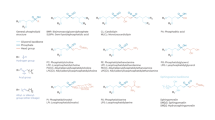Abstract
We undertook a population-based cohort study in Pizarra (Spain). Anthropometric and nutritional variables were recorded for 613 persons. The type of fat used was determined by measurement of the fatty acids contained in cooking oil. Serum fatty acid was used as a biological marker of the type of fat consumed. Obesity incidence in persons who were not obese at baseline was greater in those who consumed sunflower oil (Group 1: 41.5 (95% CI, 25.4–67.8) cases per 1000 person-years) than in those who consumed olive oil or a mixture of oils (Group 2: 17.3 (95% CI, 11.6–25.8) cases per 1000 person-years). The risk of developing obesity over 6 years, adjusted for age, sex, physical activity, smoking, instruction level, energy intake and baseline BMI, was 2.3 (95% CI, 1.06–5.02) in group 1 compared with that in group 2. The increase in the prevalence of obesity in the free-living population is associated with the type of fatty acids in the diet.
This is a preview of subscription content, access via your institution
Access options
Subscribe to this journal
Receive 12 print issues and online access
$259.00 per year
only $21.58 per issue
Buy this article
- Purchase on Springer Link
- Instant access to full article PDF
Prices may be subject to local taxes which are calculated during checkout

Similar content being viewed by others
References
Ailhaud G, Guesnet P (2004). Fatty acid composition of fats is an early determinant of childhood obesity: a short review and an opinion. Obes Rev 5, 21–26.
Bes-Rastrollo M, Sánchez-Villegas A, de la Fuente C, de Irala J, Martinez JA, Martínez-González MA (2006). Olive oil consumption and weight change: the SUN prospective cohort study. Lipids 41, 249–256.
Colditz GA, Willet WC, Stampfer MJ, London SJ, Segal MR, Speizer FE (1990). Patterns of weight change and their relation to diet in a cohort of healthy women. Am J Clin Nutr 51, 110–1105.
Golay A, Allaz AF, Morel Y, de Tonnac N, Tankova S, Reaven G (1996). Similar weight loss with low-or high-carbohydrate diets. Am J Clin Nutr 63, 174–178.
González CA, Pera G, Quirós JR, Lasheras C, Tormo MJ, Rodriguez M et al. (2004). Types of fat intake and body mass index in a Mediterranean country. Public Health Nutr 3, 320–336.
Schröder H, Marrugat J, Vila J, Covas MI, Elosua R (2004). Adherence to the Traditional Mediterranean Diet is inversely associated with body mass index and obesity in a Spanish population. J Nutr 134, 3355–3361.
Serra-Majem L, de la Cruz JN, Ribas L, Tur JA (2003). Olive oil and the Mediterranean diet: beyond the rhetoric. Eur J Clin Nutr 57, S2–S7.
Soriguer F, Rojo-Martinez G, Almaraz MC, Esteva I, Ruiz de Adana M, Morcillo S et al. (2008). Incidence of type 2 diabetes in southern Spain (Pizarra Study). Eur J Clin Invest 38, 126–133.
Soriguer F, Rojo-Martínez G, Dobarganes MC, García Almeida JM, Esteva I, Beltrán M et al. (2003). Hypertension is related to the degradation of dietary frying oils. Am J Clin Nutr 78, 1092–1097.
Trichopoulou A, Gnardellis C, Benetou V, Lagiou P, Bamia C, Trichopoulos D (2002). Lipid, protein and carbohydrate intake in relation to body mass index. Eur J Clin Nutr 56, 37–43.
Acknowledgements
We are grateful to Isabel Cardona for her inestimable technical help and to Ian Johnstone for his help with the English language version of the paper. This study was undertaken with finance from the Fondo de Investigación Sanitaria (PI041883, PI051307), Junta de Andalucía (0124/2005, P06-CTS-01684) and the Fundación Centro de Excelencia en investigación sobre Aceite de oliva y Salud (CEAS).
Author information
Authors and Affiliations
Corresponding author
Additional information
Contributors: FS, IE and GR-M contributed to the study design, GR-M, MCA, JMGA, MSRdA, FL, EG-E, SM and GO-F contributed in the data collection, FS and GR-M contributed in the data analysis, all authors contributed in writing the paper.
Rights and permissions
About this article
Cite this article
Soriguer, F., Almaraz, M., Ruiz-de-Adana, M. et al. Incidence of obesity is lower in persons who consume olive oil. Eur J Clin Nutr 63, 1371–1374 (2009). https://doi.org/10.1038/ejcn.2009.65
Received:
Revised:
Accepted:
Published:
Issue Date:
DOI: https://doi.org/10.1038/ejcn.2009.65
Keywords
This article is cited by
-
The interactions between dietary fats intake and Caveolin 1 rs 3807992 polymorphism with fat distribution in overweight and obese women: a cross-sectional study
BMC Medical Genomics (2021)
-
Cardio-metabolic and immunological impacts of extra virgin olive oil consumption in overweight and obese older adults: a randomized controlled trial
Nutrition & Metabolism (2015)
-
Olive oil has a beneficial effect on impaired glucose regulation and other cardiometabolic risk factors. Di@bet.es study
European Journal of Clinical Nutrition (2013)



